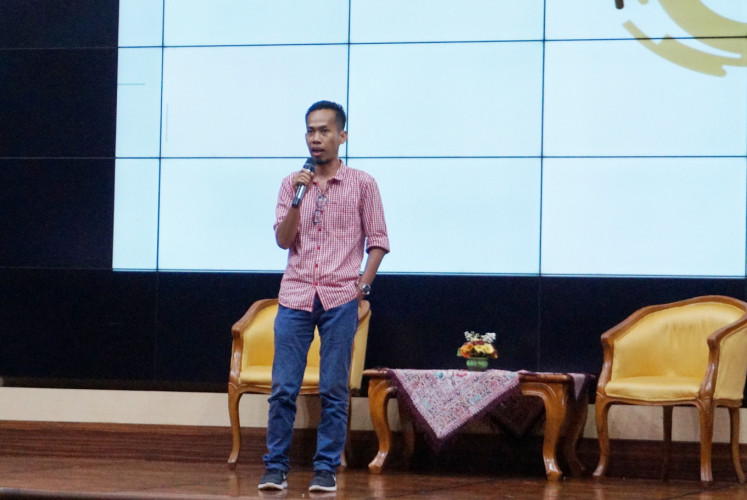Popular Reads
Top Results
Can't find what you're looking for?
View all search resultsPopular Reads
Top Results
Can't find what you're looking for?
View all search resultsPoet Aan Mansyur highlights the power of language at Cultural Congress
In his talk, Aan spoke of the possibility of writers returning to their mother tongues as a way of making Indonesian poetry more diverse.
Change text size
Gift Premium Articles
to Anyone
 During the discussion, titled Kegamangan Puisi: Antara Bahasa Ibu, Bahasa Indonesia dan Bahasa Asing (Indecision in Poem: Between Native, Indonesian and Foreign Languages), Aan encouraged the audience to be more critical in their use of language, as it was more than just a communication tool. (Education and Culture Ministry/Ronny Hertanto)
During the discussion, titled Kegamangan Puisi: Antara Bahasa Ibu, Bahasa Indonesia dan Bahasa Asing (Indecision in Poem: Between Native, Indonesian and Foreign Languages), Aan encouraged the audience to be more critical in their use of language, as it was more than just a communication tool. (Education and Culture Ministry/Ronny Hertanto)
P
oet and author M. Aan Mansyur hosted a discussion about the power of language during the Indonesian Cultural Congress (KKI), held from Dec. 5 to 9 at the Education and Cultural Ministry office complex in Senayan, Central Jakarta.
During the discussion, titled Kegamangan Puisi: Antara Bahasa Ibu, Bahasa Indonesia dan Bahasa Asing (Indecision in Poem: Between Native, Indonesian and Foreign Languages), Aan encouraged the audience to be more critical in their use of language, as it was more than just a communication tool. The “indecision” here concerns whether the Indonesian language can express all of a writer’s ideas.
Originating from the South Sulawesi regency of Bone, Aan mainly spoke the Bugis language as a child. For him, the language was able to make intangible concepts tangible. “Indonesian was considered a foreign language at that time […] [as] both my elementary school and pesantren [Islamic boarding school] used Bugis language daily,” said Aan during his talk on Wednesday night, Dec. 5.
Still considering Bugis his mother tongue, Aan uses Indonesian when writing. However, the writer of poetry book Tidak Ada New York Hari Ini (No New York for Today) often felt restricted when writing in Indonesian, as he could not find the right vocabulary to translate what he had in mind. He gave the example of the word “listening” that could be changed into “your voice touches my ear” or “thinking” into “I put you in my head” – both becoming tangible.
Aan’s examples showed the complicated connections between language, ways of thinking and culture that influence a poet. He said it required further research to find out whether Indonesian poets were affected by their native languages when thinking and writing in Indonesian, and whether it was visible in their work.
Read also: Aan Mansyur: All poems are love poems
“Perhaps it’d be more interesting for poets to return to their mother tongues to find new methods of writing. Poets who grew up with different languages may see the Indonesian language differently,” he said. “If they find new ways of writing, we can imagine how varied Indonesian poems would be.”
However, writing in native languages may not be easy. Poets may need to understand the culture and background behind it, especially how the language works within the community. Different languages have different structures as well.
Aan’s lecture did not aim to coax the audience to use their native languages. Rather, he wanted to discuss whether poets were aware of the possibility of returning to their mother tongues, as he wanted Indonesian poetry to be more diverse. “It’s not about whether I use Bugis or Indonesian,” said Aan. “But Indonesia will be more rich if writers use their native languages as a method in their writings.”
Born in 1982, M. Aan Mansyur gained national fame when his book, No New York Today, was included in the popular 2016 romance-drama movie Ada Apa dengan Cinta? 2 (What’s up with Cinta? 2), directed by Riri Riza and staring Nicholas Saputra and Dian Sastrowardoyo. His other works include Hujan Rintih-rintih (Moaning Rain) and Cinta yang Marah (Angry Love).
Meanwhile, the Indonesian Cultural Congress kicked off on Wednesday. The event features a range of activities including public lectures, film screenings, public debates, film discussions, performances and cultural parades. (wng)











